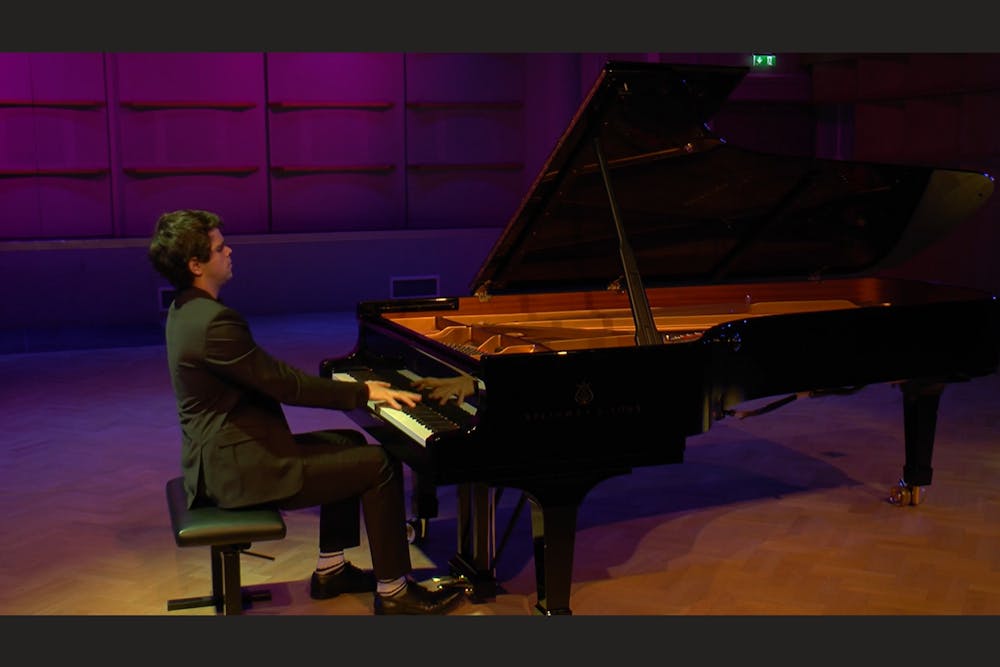The trope that “classical music is boring” often comes from those outside of the performance field. So, it might come as a surprise that this phrase was the title of a Wintersession workshop held on Jan. 18 by former professional concert pianist Noah Simon, a senior research specialist with the Industrial Relations Section in the Department of Economics.
Simon acknowledged his workshop title was “provocative,” though he later added the subtitle, “... but here’s how to find the real stuff!” The workshop name reflects Simon’s belief that classical music performance has experienced a “dark era decline” since the 20th century, and he made recommendations of older recordings to attendees. The workshop was a part of Wintersession’s two weeks of programming in which members of the University community can lead and attend workshops in a no-cost, no-pressure environment.
While Simon pointed out the flaws in modern recordings, he also said he hoped to encourage listeners to contemplate classical music with a more critical eye by developing an appreciation for older recordings.
“I wanted to speak to something that I feel really deeply about,” Simon explained in an interview with The Daily Princetonian. “When I go to classical concerts, the vast majority of them are incredibly boring. We’re being presented with much less than classical music truly has to offer.”
“I want to give people the courage to call out [classical concerts] for being boring when they are,” Simon added. “We should have the courage to demand more as an audience.”
According to Simon, classical music used to have more societal influence than it does today.
“Classical music occupied a different space in the cultural landscape of the early or mid-20th century,” he said. “Think of Vladimir Horowitz selling out Carnegie Hall — it was just a frenzy. [He] set the city on fire because it was so incredible and took the audience to new heights. This kind of experience was central to our cultural imagination, to what it meant to experience great art.”
To frame the role of performers, in his lecture Simon analogized classical musicians as “curators of the museum” and the pieces as “live paintings” that constantly need to be revived and preserved through authentic interpretations in accord with the composer’s original intention.

Simon compared mid-20th century and modern classical recordings side by side, providing live analysis of the disparity in technique and artistic interpretation of the pieces. For example, he compared two recordings of Mahler’s Symphony No. 4 by Willem Mengelberg and Leonard Bernstein respectively, two of the most well-known conductors of the 19th and 20th centuries.
According to Simon, the former concert pianist defined interpretation as, rather than superficial decisions about how to play the piece, the performance’s aesthetic disposition towards “the kernel of meaning within the musical text.” He argued that Mengelberg stays true to the piece’s core of being a “playful, fun dance,” leaning into the individuality of the piece to “extract each contour.” On the other hand, Bernstein “normalizes” the piece into a superficially elegant trope of classical music.
Simon argued that the newer style has normalized classical music into shallow, artificially smooth interpretations and compared trying to find the meaning within them to “trying to find each line of a face under makeup.”
“Hopefully, if I can highlight this change, people can better appreciate what classical music really has offered,” Simon said in an interview with the ‘Prince.’ “My main goal is to get people to listen to classical music, to realize that it can overwhelm you, move you, and provide you with new information about the world.”

“[Classical music] is not just something you dress up for to feel like you are at the height of culture,” he continued. “It should be something that moves you, something that gives you information about the world. It curates sound in incredible ways that you don’t experience on a day-to-day basis.”
However, Simon remained skeptical when asked if more musicians would continue to perform authentically.
“I have a lot of young musician friends who I think are incredibly talented, deep players that absolutely transport audiences in that way,” Simon said. “A lot of them are becoming quite successful and it makes me very optimistic for the future of classical music. At the same time, I hear a lot of musicians who don’t move me at all.”
“You shouldn’t be some kind of actor trying to read a monologue in a happy or sad way to evoke this superficial reaction,” Simon added. “You read the DNA of the music and you build whatever organism the composer wanted you to build truthfully and seriously.”
Beyond interpretation, Simon critiqued the sound quality in modern recordings despite the improvement in audio technology. In his workshop, he referenced an interview with Renata Tebaldi, one of the most renowned Italian opera singers of the 20th century. In contrast to her projective technique, she critiqued singers relying on microphones using “very, very small voices like mosquitoes … we don’t hear operas in the way composers conceived them to be performed.”
Similarly, for classical music, “despite the fact that recordings today are engineered so well, the sound quality of the playing itself is so much worse,” Simon said. “If you look at singers recording albums, the microphones are basically inside their mouths because basically none of them knows how to make real sound anymore.”
Simon said that the sound quality of classical performance goes beyond the surface.
“There are ways of playing the piano that are something more than just a physical action or producing some surface-level effects,” Simon told the ‘Prince.’ “It’s about creating meaning and understanding how to transform black dots on a page into an informative experience. Like how a painting or theater can transport — it's the same idea of sculpture, for example — sculpting meaning out of music, out of sound.”
Among the 28 attendees were several classical musicians themselves, including Lou Chen ’19, the program manager for Trenton Arts at Princeton and the director of the Trenton Youth Orchestra. Chen described the event as “quite compelling.”
“I thought [Simon] uncovered some really fascinating recordings that I was not aware of,” Chen said in an interview with the ‘Prince.’ “I think that in the current digital age, we do prioritize recordings to sound clean [over the quality of the actual playing].”
“I had never heard of Christian Ferras, and he’s been all I’ve been listening to ever since,” he added.
Chen agreed with Simon that classical music is less popular among younger people and said that it was “really cool to see someone who was that invested in classical music.”
“The classical music population is getting older,” Chen added. “I think young audiences for various reasons are turned off by classical music. It’s too elite. It’s too expensive.”
“Ambivalence does not breed investment,” Chen said. “I hope the curiosity that the talk has sparked in me and everyone else will lead to exploration.”
Another attendee was Milo Salvucci ’27, a 12-year classical pianist and 8-year percussion player in the Princeton University Orchestra and Sinfonia, who thought that the class “wasn’t quite what [he] expected it to be about, in a good way.”
“I was expecting the class to focus more on the actual music and why it was boring,” Salvucci said in an interview with the ‘Prince.’ “Instead, it focused pretty much only on the performers who are playing the music, how they’re performing it, how they’re interpreting it, and how they’re being taught to play music.”
He added that as a pianist, there were only a few pianists that he “really trusted for their recordings.”
“I do agree [with Noah] that there are a lot of interpretations out there that are not what the composer intended the music to be, or just not what people would enjoy listening to,” Salvucci said.
For Simon, the workshop was an opportunity to share knowledge from his fourteen years of musical training.
“Most people can’t spend years studying classical music. So hopefully I can serve the role of some strange kind of scuba diver,” he said. “I want to bring up the treasures I found on the ocean floor and share them with others.”
Chloe Lau is a staff Features and Prospect writer for the ‘Prince.’
Please send corrections to corrections[at]dailyprincetonian.com.








